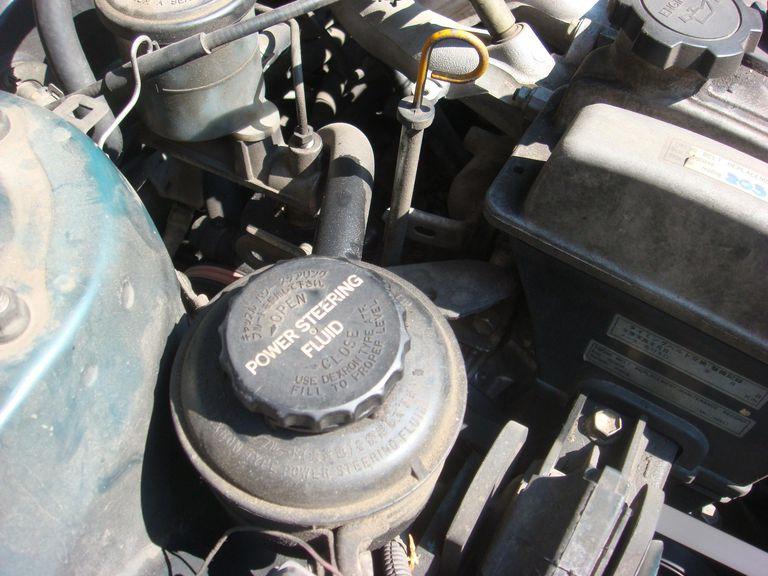No, you should not use transmission fluid for power steering fluid. Transmission fluid and power steering fluid have different properties and functions.
Using the wrong fluid can damage your vehicle’s systems. Cars have many fluids, each with a specific job. Power steering fluid and transmission fluid might look similar, but they serve different purposes. Power steering fluid helps you steer smoothly, while transmission fluid keeps your car’s transmission running well.
Mixing them up can lead to costly repairs and safety issues. Understanding the differences can help you maintain your car properly. In this blog post, we will explore why using the correct fluid is important and what could happen if you don’t. Stay tuned to learn more about the roles of these fluids and how to avoid common mistakes.

Credit: carfromjapan.com
Can You Use Transmission Fluid For Brake Fluid
Using transmission fluid for power steering fluid is not recommended. Different fluids have unique properties and purposes. Mixing them can harm your vehicle’s performance and safety.
Car maintenance can be confusing. Especially when you think about using one fluid for another purpose. One common query is whether you can use transmission fluid for brake fluid. Let’s explore this topic under various aspects.
Differences Between Transmission Fluid And Brake Fluid
Transmission fluid and brake fluid serve different purposes. Here are the key differences:
- Purpose: Transmission fluid lubricates gears; brake fluid transfers hydraulic force.
- Composition: Transmission fluid is petroleum-based; brake fluid is glycol-based.
- Heat Tolerance: Brake fluid can handle higher temperatures; transmission fluid cannot.
Potential Risks Of Mixing Fluids
Using the wrong fluid can cause issues. Here are some potential risks:
- Damage to Seals: The wrong fluid can cause seals to degrade.
- Brake Failure: Incorrect fluid can lead to brake system failure.
- Safety Hazards: Mixing fluids can create dangerous driving conditions.
Manufacturer Recommendations
Always follow the manufacturer’s guidelines. They specify the correct fluids for a reason:
- Specific Formulation: Each fluid is designed for its specific system.
- Warranty Concerns: Using the wrong fluid might void your vehicle’s warranty.
- Optimal Performance: Correct fluids ensure your vehicle runs smoothly.
Emergency Situations
In emergencies, you might consider using available fluids. However, think twice before using transmission fluid for brakes:
- Short-Term Solution: It might work temporarily but is not a long-term fix.
- Immediate Repair: Seek professional help immediately after using the wrong fluid.
- Safety First: Prioritize safety over convenience.
Long-term Effects
Using the wrong fluid has long-term consequences. Here’s what you might face:
- Corrosion: Wrong fluids can corrode metal components.
- Reduced Efficiency: Brake systems may not work efficiently.
- Costly Repairs: Fixing damages can be expensive.
Professional Advice
Consult with a professional mechanic before making any changes. They can provide:
- Expert Insight: Mechanics understand the intricacies of vehicle fluids.
- Safety Checks: Professionals can ensure your vehicle is safe to drive.
- Proper Maintenance: Regular check-ups can prevent fluid mix-ups.
Understanding the importance of the right fluid can save you from potential headaches. Always use the correct fluid for your vehicle’s systems.
Can You Use Transmission Fluid For Hydraulic Fluid
Transmission fluid can sometimes work as power steering fluid in emergencies. It’s vital to check your car’s manual first. Compatibility depends on your vehicle’s specifications.
Using the right fluids for your vehicle is crucial. Many wonder if transmission fluid can be used for hydraulic systems. Let’s dive into this topic and see what’s best.
Differences Between Transmission Fluid And Hydraulic Fluid
Transmission fluid and hydraulic fluid may seem similar. But they have differences:
- Composition: Transmission fluid contains additives; hydraulic fluid does not.
- Viscosity: Transmission fluid is designed for specific flow; hydraulic fluid varies.
- Purpose: Transmission fluid lubricates gears; hydraulic fluid powers hydraulic systems.
Potential Risks Of Mixing Fluids
Mixing fluids can cause problems. Here’s why:
- Compatibility: Not all fluids mix well, leading to system damage.
- Performance: Incorrect fluids can affect efficiency.
- Damage: Long-term use of the wrong fluid can harm components.
Manufacturer Recommendations
Always follow manufacturer guidelines. They know what’s best for their systems.
- Manual: Check your vehicle’s manual for specific instructions.
- Labels: Read fluid labels to ensure compatibility.
- Consult: Speak with a professional if unsure.
Cost Implications Of Using Incorrect Fluids
Using the wrong fluid can cost you. Here’s how:
- Repairs: Damage from incorrect fluids can lead to expensive repairs.
- Maintenance: More frequent maintenance may be needed.
- Replacement: In severe cases, entire systems may need replacing.
Credit: www.kevianclean.com
Conclusion
Using transmission fluid for power steering fluid can be risky. Different fluids have different properties. Using the wrong fluid can damage your car. Always check your car’s manual. Manufacturers specify the right fluids. Safety first. Use recommended fluids to avoid costly repairs.
Don’t mix fluids. Protect your vehicle. Keep it running smoothly with the right products.
